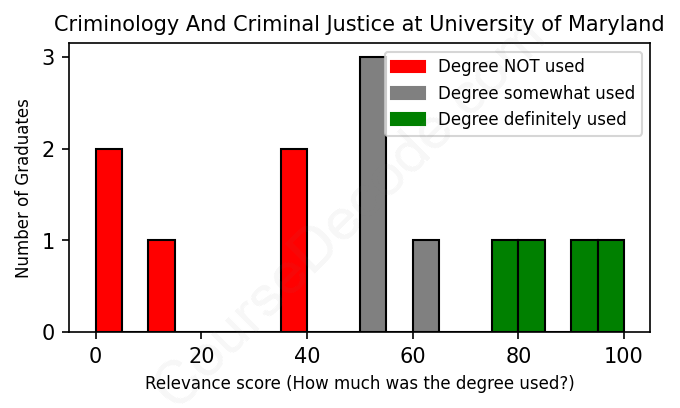
First, some facts. Of the Criminology And Criminal Justice graduates from University of Maryland we've analyzed , here's how many have used (or NOT used) their degree in their career:

These are estimates based on AI analysis of 13 LinkedIn profiles (see below).
The verdict? Significantly below average. Overall, with an average relevance score of 49%, Criminology And Criminal Justice graduates from University of Maryland have a much lower likelihood (-18%) of finding work in this field compared to the average graduate across all fields:
And for comparison, here's the chart for all profiles we've looked at across all degrees.
Also, after graduating, 53% of these graduates have pursued further education other than another Bachelor's degree (such as a Masters degree or other), compared to the average across all profiles of 35%. This suggests you may need more than just a Bachelors degree to be competitive as a Criminology And Criminal Justice graduate.
See the details:
|
Relevance score: 93% We think this person has gone into a career highly relevant to their degree. We think this person has gone into a career highly relevant to their degree.
DEGREE INFOGraduated in 2018 from University of Maryland with a Bachelor of Arts - BA in Criminology And Criminal Justice. No other secondary education since. JOB HISTORY SINCE GRADUATIONAsset Protection Supervisor - Logistics and Operations Macy's Apr 2019 - Feb 2020 Asset Protection Partner  Walgreens Feb 2020 - Feb 2021 District Asset Protection Leader  CVS Health Mar 2021 - Present Senior Manager Asset Protection Emerging Leader  CVS Health Aug 2023 - Present ABOUTAccomplished Asset Protection leader with eight years experience and an appetite for growth. My approach to problem-solving is rooted in correcting process deficiencies and forging partnerships at all levels of the enterprise as well as outside agencies. With a passion for learning, I seek continuous improvement through development opportunities and proactive feedback from others. I thrive in a fast-paced environment and have a proven record of success in both a multi-unit retail, and supply chain setting. |
The top 10 most common jobs done by the graduates we've analyzed (ranked most common to least) are:
From reviewing various LinkedIn profiles of graduates from the University of Maryland with a degree in Criminology and Criminal Justice, it's clear that many of them have pursued careers that don't directly align with their field of study. A significant number have taken roles in education, retail, and tech, such as teachers, sales managers, and customer service positions, which are largely unrelated to criminological principles or criminal justice processes. While some individuals have landed internships or positions in legal settings or law enforcement, such as police officers or legal interns, these are more sporadic compared to the broader range of careers in areas like education and sales.
However, there are definitely standout positions that are directly relevant to Criminology and Criminal Justice, like roles at the FBI, police departments, or legal internships. These jobs tend to utilize the skills and knowledge gained during their studies effectively. Overall, while some graduates have found their niche in the field associated with their degree, a substantial portion has veered into unrelated areas, suggesting a mixed bag when it comes to the relevance of their first jobs after graduation. It's a reminder that not everyone ends up in a job that directly aligns with their major, which is common across many disciplines.
Here is a visual representation of the most common words in job titles for Criminology And Criminal Justice graduates (this is across all Criminology And Criminal Justice graduates we've analyzed, not just those who went to University of Maryland):

So, looking at the career paths of graduates from the University of Maryland who studied Criminology and Criminal Justice, it seems like they’ve had a mix of success in relevant fields and some that veer off into completely different territories. For many, the first jobs after graduation are often internships or entry-level positions in legal or educational settings, which makes sense since they’re starting their careers. For instance, we see graduates taking on roles like legal intern or teaching positions shortly after graduating. That's pretty common in this field as they dip their toes into the professional world and gain necessary experience.
As we look a bit further down the line—like five or ten years after they graduate—many of them seem to have transitioned into more established roles in law enforcement, policy analysis, educational leadership, or security operations. Some have climbed the ranks within organizations like the FBI or police departments, while others have moved into significant positions at companies focused on compliance and security. However, there are also graduates who end up in entirely unrelated fields like sales or education, which suggests that while some pursued careers aligned with their degree, others might have taken different paths that are not directly tied to criminology or criminal justice. So, while many do find solid careers within their area of study, there’s also a noticeable number who explore other opportunities along the way, which is quite common for graduates in any discipline, really.
Alright, so getting a Bachelor’s degree in Criminology and Criminal Justice at the University of Maryland, or really anywhere, isn’t the easiest ride, but it’s not like climbing Mount Everest either. You’ll definitely have to put in some serious effort, especially with coursework that digs deep into theories, case studies, and stats about crime and justice systems. There will also be essays and probably some group projects that can feel a bit overwhelming at times, but if you're genuinely interested in the topics, it can also be pretty engaging. Overall, it’s about average in difficulty—challenging enough to keep you on your toes, but if you stay organized and passionate about what you’re learning, you should be able to handle it!
Most commonly, in the LinkedIn profiles we've looked at, it takes people 4 years to finish a Bachelor degree in Criminology And Criminal Justice.
Looking through the career paths of these Criminology and Criminal Justice graduates from the University of Maryland, it seems like most of them are doing pretty well for themselves, especially when you consider the roles they're landing. For example, the ones who shifted into government roles or advanced positions at organizations like the FBI and Humana likely have solid salaries, while those in educational roles, like the math teacher, can expect a decent but not extravagant paycheck. Some early-career folks are still figuring things out with internships or part-time gigs, which might not pay much right now. Overall, just based on these job titles and companies, it looks like a good number of them are on track for decent earnings, especially as they gain more experience and move into higher roles.
Here is a visual representation of the most common words seen in the "about" section of LinkedIn profiles who have a Bachelor degree in Criminology And Criminal Justice (this is across all Criminology And Criminal Justice graduates we've analyzed, not just those who went to University of Maryland). This may or may not be useful:

Here are all colleges offering a Bachelor degree in Criminology And Criminal Justice (ordered by the average relevance score of their Criminology And Criminal Justice graduates, best to worst) where we have analyzed at least 10 of their graduates:
| College | Score | Count |
|---|---|---|
 University of Maryland University of Maryland
|
49 | 13 |